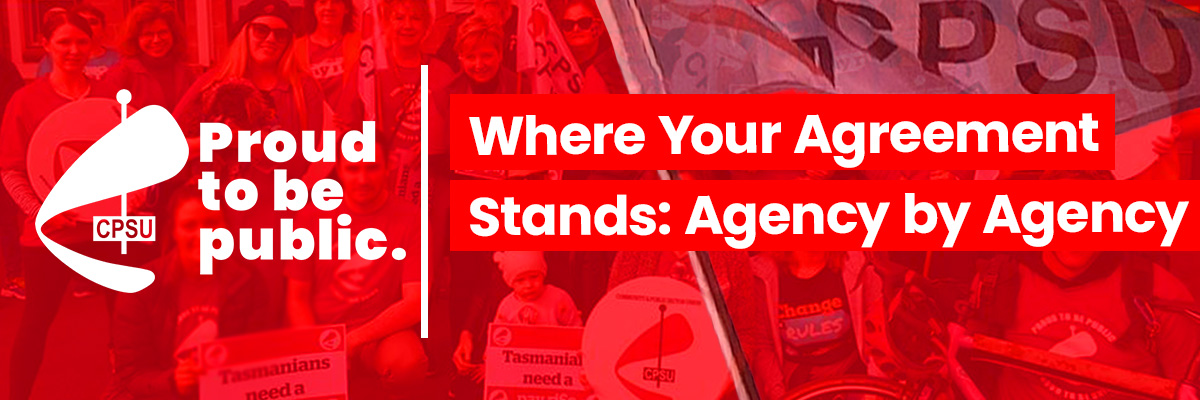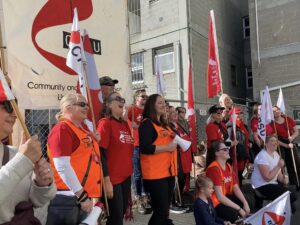
In its third offer to CPSU members, the Rockliff Government reiterated its threat that it would refuse to backdate pay rises if we don’t reach an agreement by 1 December 2022, when your next pay rise would normally be due. Despite the fact that it has failed to address a vast swath of the matters raised in your Log of Claims, and that their offer fails to deliver pay rises which keep up with rising cost of living.
We made this point in a recent meeting with Government, who committed to a “fast-tracked” process to bring us closer to clarity on which matters from your Log of Claims are agreed to – or not. Results have been … mixed, to put it mildly.
So far Agencies have only been talking about the problems, when we need to be working through solutions – which we have in our claim, designed by members, solutions based on their expertise on the ground.
Many of those leading the Agency negotiations haven’t even been briefed on our claim and aren’t in a position to bargain. We’ve also seen agendas sent through at the last minute, some completely bereft of detail.
These are discussions that should’ve happened a lot earlier, there are significant modernisations that are needed but for this to happen, we need time to do so.
The Government’s most recent offer addresses just 10 conditions matters, with the nebulous ‘commitment’ to “work through the longer-term industrial agreement commitments raised in the logs of claim” over the 18 months after an Agreement had already been signed. In other words, an informal talk-fest with no obligation for the Government to ever follow-through. That simply isn’t good enough.
Are we really expected to believe that a Government which has failed to deliver on matters from the previous Agreement which it agreed to in-writing (such as a service-wide Mobility Register) will continue to work through claims after bargaining has concluded and an Agreement has been signed?
To give you more insight into what this process has been like, we reached out to CPSU Delegates who have attended bargaining meetings for an insider’s perspective:
CPSU Delegate Rebecca Lyons on the fast-tracked negotiations in Justice
I was a bit disappointed with the Agency staff who were there to negotiate.
I found that they weren’t fully informed. One of them made a comment that they’d have to go away and do some research about broadbanding because they weren’t up on it.
From my perspective, they’d had the Log of Claims since August and were sitting at a bargaining table, so to come to a meeting without doing your homework is unacceptable to me.
They had no clue that we had had a walk-out of staff, probably upward of 30 in the last two years, but they were just oblivious to that – a senior person in Justice HR.
[CPSU Assistant Secretary] Tom Lynch also had to keep bringing them back to the Log of Claims, as they tried to dismiss it quite a bit.
It felt like they didn’t want to engage with the complete log of claims, they just wanted to have a chat. For people to come to a negotiation meeting without putting a bit of effort in, it was very disappointing. The feeling I got was it wasn’t that important from the employer’s side.
Sonia Guizzo on AHP fast-tracked negotiation meetings
“I don’t know why they are called “fast-tracked negotiations” – I haven’t seen any kind of results as yet. From the last meeting, there were some good vibes in the room and there were some possibilities perhaps, but there was nothing I could come away with that was a decision. There was nothing that really came out of it.”
Tania Shilcock on fast-tracked State Growth negotiation meetings
Our claims are not unreasonable. It’s an opportunity to get acknowledgement that things need changing.
We had two Claims for State Growth – these problems were acknowledged and taken seriously.
The first was looking at the appropriateness of Band 1 positions for Visitor Services Officers at TMAG.
The other was the progression path for specialists in ICT and the ability for them to progress without management responsibility – agreed it was a need so we can attract experts into the public service, especially in terms of cyber security.
On the fast-tracked negotiations, it’s been really slow because at the table there’s a lack of understanding generally around the issues that exist. So, all negotiations have achieved so far is raise awareness of the issues that exist. That really highlights what’s happening with the employer and public sector workers. This disconnect is also apparent when the government shows up with a pay offer that insults its employees.
We’re trying to change things for the future and build capability in the state service and recruiting and retaining good people. But the Government isn’t looking at issues in terms of future proofing our public sector. There’s no sense of what the cost of living is. They seem out of touch with the working situation is here in Tasmania and how it’s no good, in terms of what workers can get elsewhere.
By the time they come to the table and realise that it could cost them in terms of the quality of staff they have to support Tasmanians.
Rafael Molina on fast-tracked NRE negotiations
There seemed to be an intention to deal with the problems but there didn’t seem to be an awareness of some of the realities within the Agency.
I felt the meeting was a little bit clumsy in getting started. I think there is perhaps too much time pressure and I feel that we may not have enough time. If we get into the detail, the nitty gritty of a claim, we may not have enough time. Some of the Agency staff wanted clarification about different claims, so that’s an example of why these proceedings need a bit of time.
Allowances it comes down to an amount or when it applies – when you get to that to that level of detail you need some time to go back and forth and agree on wording to be included in the agreement. Or review the amount and compare to other jurisdictions or other agreements in the Tasmanian State Service.
Scott Ragg on Department of Health fast-tracked negotiations
I thought the Department were listening, they wanted to understand the issues. They seemed genuinely unaware of some of the issues that led to certain conditions being sought. Once they understood they agreed it had to be fixed. They were more than happy to consider the CPSU claim that employees are provided with access to flexitime.
There is so much that needs to be fixed after the neglect of the Awards for so long. The fast-tracked process isn’t going to resolve anything within the timeframes required.
The officers from the department were there to genuinely find out what the issues were and understand how the claims had arisen. I don’t think they were in a position to say yes or no.
The employer is still learning what the problems are, they seem to be operating in a vacuum away from the day-to-day workplace. Some people get a paid meal, some get a paid meal break and some get nothing.
A fast-tracked negotiation needs the employer to have a good understanding of their workplace- and they don’t. We’re busy educating them about what the problems are. Fast tracking is a misnomer.
Brenda McLarin on Department of Education fast-tracked negotiations
I found that there’s not enough time to really discuss anything.
Some of the problems, for example are dependant on who is making decisions in any given school. Whether admin workers get a morning tea break, for example. Or the toileting allowance, if a school has chosen not to give that allowance to Teacher Assistants. We need to look at those issues collectively, rather than at someone’s whim.
There are a lot more responsibilities that are delegated from Principals to school business managers, and we have no one to delegate to because we really need broadbanding in school administration.
Those who were negotiating on behalf of the Department weren’t really open to any discussion, maybe because it was on a tight time frame, or they’re sick of hearing what we have to say because we’ve been saying it for so long.
Perhaps they just don’t realise what’s happening on the ground, like the Libraries staff who are on Band One for so many years, and the negotiators didn’t seem to realise it was happening. They don’t seem to have a clear view of what is happening on the ground. I get the feeling that if they did understand they probably wouldn’t want to know about it anyway because it creates other problems to deal with.
I don’t know how you can do it fast-tracked when there are so many issues to find a solution to.
Lizzie Conway, Libraries Tasmania on Department of Education fast-tracked negotiations
Overall, I thought there wasn’t a lot of movement. There was a lot of “we’ll look into that, we’ll look into this”, nothing really committal.








